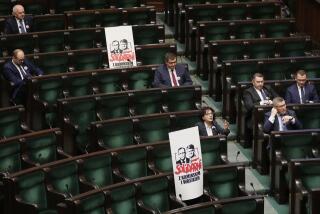Challenge by Activist: Why Exonerate Nazis? : Lithuania: The prosecutor says that rehabilitating people convicted by courts of genocide is prohibited.
MOSCOW — Veteran human rights activist Yuri Orlov confronted Lithuania’s chief prosecutor Monday and demanded to know why the newly independent country is exonerating Nazi war criminals.
Chief prosecutor Arturas Paulauskas replied that Lithuanian law forbids rehabilitation of people who were convicted of genocide in Soviet courts. But he said that Lithuania does not recognize the decisions of Soviet tribunals, or “troikas,” and that people convicted by such tribunals will be rehabilitated unless there is new evidence against them.
Hundreds of cases came before these three-member Soviet tribunals, undoubtedly including some involving war crimes. Many Nazi war criminals were also convicted of lesser crimes than genocide, which means they could be rehabilitated under Lithuanian law.
Rabbi Marvin Hier, head of the Wiesenthal Center in Los Angeles, said it has turned over documents to the State Department showing that at least three individuals rehabilitated by the new Lithuanian government had participated in the murder of Lithuanian Jews.
Orlov, a former Soviet political prisoner and Jewish activist, was one of several human rights campaigners who raised the issue of Lithuania’s exonerating Nazi war criminals at a seminar sponsored by U.S. Helsinki Watch on the eve of the opening of a 35-nation human rights conference in Moscow.
Reports that Nazi war criminals were among about 35,000 people Lithuania has rehabilitated since its independence drive began in 1988 touched off protests from Jewish groups in the United States and Israel.
At a news conference, Orlov demanded to know why Lithuania is reluctant to initiate investigations of alleged Nazi war criminals.
“The annihilation of the Jews of Lithuania was done with the connivance of Lithuanians and Poles who resided there. . . . Why are you so reluctant to undertake investigations?” Orlov asked.
Paulauskas said Lithuania will investigate if new evidence is uncovered in the KGB archives or presented by the Wiesenthal Center or other independent groups. But he told Orlov that Lithuania does not have an “army of investigators and judges.”
“You cannot talk in general terms of legal matters,” Paulauskas said. “Do you have information on people who are guilty of these matters?”
Orlov replied: “You are an advocate of a formalized position. If people were convicted by legitimate courts, that’s legitimate, if by ‘troikas,’ not.”
Orlov appeared surprised at the existence of Article 3 in the Lithuanian Law on Rehabilitation that says people found guilty of crimes of genocide during World War II are not eligible for rehabilitation.
“To some extent the fate of the Lithuanian republic depends on this, because aid from America depends on whether you make this article public or not,” said the activist, who teaches at Cornell University in New York state.
The prosecutor said it had already been made public.
Rights activist Sydney Siskin of New York, a friend of Orlov’s, told Paulauskas: “You are . . . a small distance away, because of this with the Nazis, of losing the support of many thousands of Americans who spiritually fought for Lithuania.”
Paulauskas stressed, however, that Article 3 applies only to people convicted in courts, not tribunals or “troikas.” The three-man “troikas” were used by Stalin beginning in the 1930s to conduct show trials against so-called enemies of the state, convicting defendants often without evidence.
Officials said last week that Lithuania had agreed to review two pardons at the request of the Wiesenthal Center. They said they could find no information in their files on the other 11 names provided by the American Nazi-hunters.
More to Read
Sign up for Essential California
The most important California stories and recommendations in your inbox every morning.
You may occasionally receive promotional content from the Los Angeles Times.










